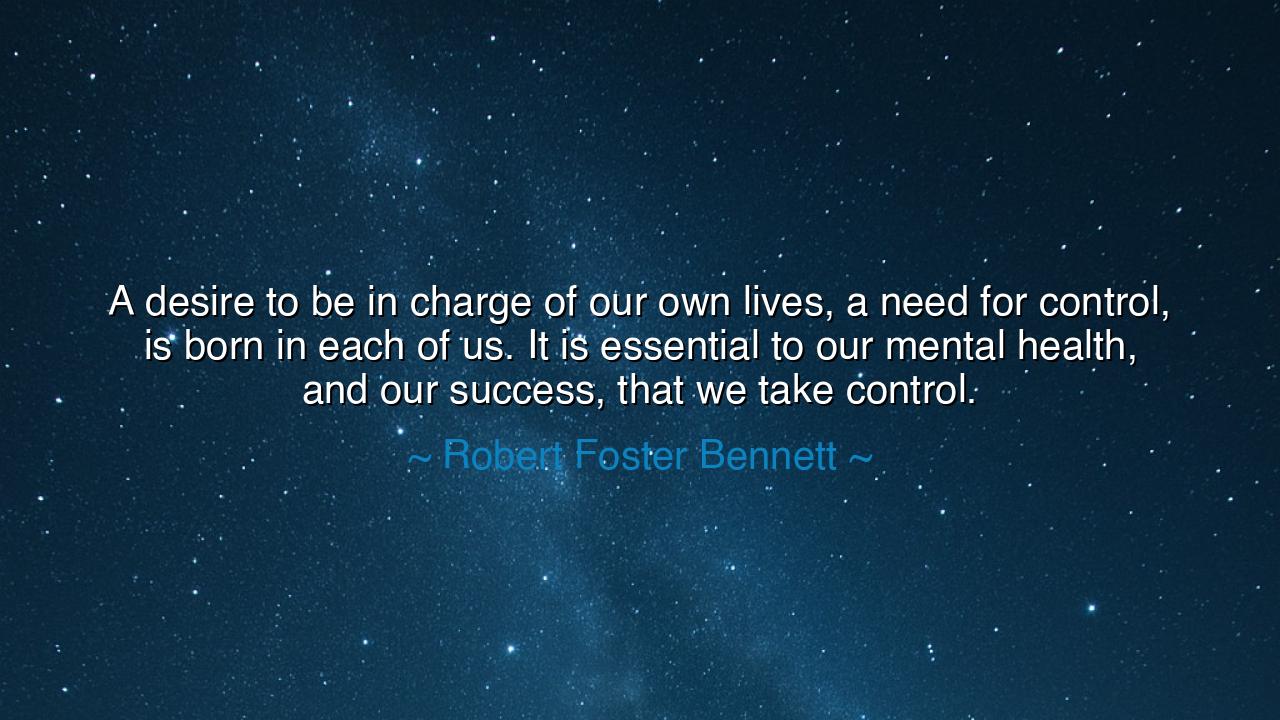
A desire to be in charge of our own lives, a need for control, is
A desire to be in charge of our own lives, a need for control, is born in each of us. It is essential to our mental health, and our success, that we take control.






The words of Robert Foster Bennett, “A desire to be in charge of our own lives, a need for control, is born in each of us. It is essential to our mental health, and our success, that we take control,” speak to one of the deepest instincts of the human soul — the yearning for sovereignty over one’s own destiny. From the dawn of civilization, man has sought to shape his world rather than be shaped by it. Bennett reminds us that this drive is not born of arrogance, but of nature itself. To take control is not merely to command circumstances, but to govern the self — to master one’s thoughts, choices, and direction. For without that mastery, life becomes a leaf blown by every wind, a ship adrift without a rudder.
The origin of this quote reflects Bennett’s philosophy as a statesman, entrepreneur, and mentor. Throughout his career, he observed that true fulfillment does not come from external success alone, but from the inner strength to direct one’s own path. He lived in a time when many surrendered their will to systems, markets, or fate — and so he spoke as a voice of renewal, calling people back to the ancient virtue of agency. To be in charge of one’s life, he taught, is not a privilege but a duty — a sacred responsibility to one’s mind, one’s purpose, and one’s future. In these few words, Bennett condenses an age-old wisdom: that mental health and success both grow from the same root — the conviction that we are not helpless, but capable, not victims of life’s storms, but pilots upon its seas.
In the style of the ancients, we might say that control begins not with dominion over others, but with dominion over oneself. The Stoics, from Marcus Aurelius to Epictetus, taught that freedom lies not in the absence of constraint, but in mastery of one’s reactions to it. “You may not control the world,” they said, “but you may always control your mind.” Bennett’s wisdom mirrors this truth. The desire to be in charge is the voice of the spirit refusing to be enslaved by fear, doubt, or circumstance. When that voice is silenced — when a person resigns their will — their mental health falters, for the soul was never meant to live as a prisoner.
History gives us radiant examples of this truth. Consider Helen Keller, who though struck blind and deaf as a child, refused to surrender her agency. Through fierce determination and guidance, she learned to read, speak, and write, becoming one of the greatest advocates for human rights in history. Her life proves Bennett’s words: that the act of taking control — even in the smallest ways — is what restores dignity, sanity, and power. She could not control her condition, but she could control her response to it. And that choice transformed not only her life, but the lives of millions who drew strength from her example.
Control, then, is not about dominance, but responsibility. It is the realization that while fate may cast the dice, we choose how to play them. The one who relinquishes control to fear or circumstance loses not only direction but the will to grow. Modern society often mistakes comfort for freedom — but comfort without control breeds weakness. Bennett’s teaching is a reminder that the health of the mind depends upon the exercise of choice, upon knowing that our decisions matter. Every act of self-discipline, every decision made with clarity, strengthens the spirit’s sense of authorship over its own story.
At its deepest level, control is the balance between surrender and command. One must not seek to control all things — for that leads to tyranny of the soul — but to control what is truly one’s own: thoughts, words, and actions. The wise man does not rage at the storm; he steers his vessel through it. He knows that mastery over the self is mastery over life. Thus, Bennett’s words are not a call to obsession, but to empowerment — to the peace that comes when one stands firm, unbroken by chaos, knowing he has done all that lies within his will.
The lesson is as simple as it is profound: take ownership of your life. Do not wait for the world to hand you peace or purpose — create them. Govern your habits, your emotions, your time, and your choices. When you fail, rise again and reclaim your course, for the act of trying is itself an affirmation of health. The mind thrives when it knows it has agency; it withers when it feels powerless. Therefore, nurture your power — not over others, but over yourself.
So let these words of Robert Foster Bennett be passed down as a law of life: to control oneself is to be free; to abandon control is to decay. Each man and woman is born with the divine right — and the divine burden — to steer their own course. Cherish it. Exercise it. For the mind that governs itself will always find strength, and the spirit that takes responsibility for its own path will never be broken by the world.






AAdministratorAdministrator
Welcome, honored guests. Please leave a comment, we will respond soon